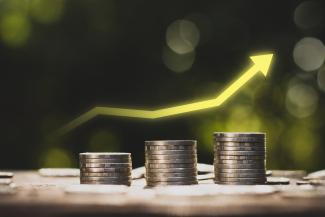
Compounding Through Chaos: How to Stay Focused Amid Market Uncertainty
In today’s unpredictable economic climate, it can be tempting to try to react to short-term market movements. Headlines are dominated by volatility, inflation concerns, tariffs, and potential recessions. As a result, investors may feel inclined to pull back, waiting for the “right time” to invest. However, history shows that long-term commitment and the power of compound interest are two of the most effective strategies for building lasting wealth.
In this blog post, we will explore the significance of compound interest, how market uncertainty often affects investor decisions, and why staying invested can help you achieve your financial goals despite market fluctuations.
Understanding Compounding Interest as a Key to Long-Term Growth
Albert Einstein is famously quoted stating that “compound interest is the eighth wonder of the world.” This conclusion is grounded in understanding that compounding occurs when earnings generate additional returns over time, exponentially increasing one’s wealth. This simple yet powerful principle rewards those investors who are patient and resist the urge to react to short-term market fluctuations.
Let’s look at an example: If you invested $10,000 today and were able to earn a 6% annual return, in 30 years (without taking distributions) you would have a little over $57,000 without adding another dime.
Allowing yourself time in the market and the art of compound interest to work in your favor is one of the hallmarks of a wise investor.
The Impacts of Market Uncertainty on Investor Behavior
Market uncertainty is inevitable, and economic downturns can create fear among investors. There is a large psychological component to investing, and often investors can react emotionally by selling investments during market declines or delaying contributions on hopes of “timing the market.” While these might be common responses, history tells us:
- Missed Market Days Matter: Research shows us that missing just 10 of the best market days over the course of a twenty-year period can significantly reduce overall returns. Markets will often recover swiftly after downturns, meaning those who stay invested are more likely to benefit from rebounds. This principle is discussed in more detail in Alex Rasmussen’s article “Staying the Course.”
- Economic Cycles are Temporary: While recessions and bear markets can be painful, they do not last forever. Currently, in the United States, tariffs and trade policies have created some disruptions in the market. Thankfully these disruptions are often short lived and lead to shifts in the supply chain which will create new economic opportunities. Overall, it is key to remember that the market has historically trended upward over time, despite periodic volatility.
- Emotional Investing Can Be Costly: Allowing fear and speculation to be your guide often leads to missed opportunities and unnecessary losses. Instead, choose to focus on a disciplined, long-term strategy that can provide more stability and opportunity for compound interest.
Strategies to Maximize Compounding Growth in Uncertain Markets
Keep Investing Regularly – Using a dollar-cost averaging approach (investing a fixed amount at regular intervals) can reduce the impact of market volatility and help you benefit from lower prices during downturns.
Reinvest Dividends – Dividend-paying stocks provide an additional layer of compounding growth. By reinvesting dividends rather than cashing them out, you can accelerate your investment growth over time.
Diversify Your Portfolio – Spreading investments across different asset classes, industries, and geographic regions can reduce risk and create more stability during market fluctuations.
Keep Your Money Invested – In order for compound interest to work in your favor there is one necessary component: time. Therefore, even amidst market volatility, it is important to stay the course and acknowledge that short-term volatility is just noise in the broader journey toward long-term gains.
Market uncertainty is a natural part of investing, but reacting emotionally or trying to time the market can sabotage long-term financial goals. By embracing the power of compound interest, staying invested, and applying disciplined strategies like diversification and dollar-cost averaging, investors can navigate chaos and build sustainable wealth over time.
Disclosure: The information provided in this blog post is for educational and informational purposes only and should not be construed as financial advice. While we strive to present accurate and up-to-date information, the financial, tax, and legal landscape is subject to change, and individual circumstances vary. Readers are encouraged to consult with a qualified financial advisor or professional before making any financial decisions or implementing strategies discussed in this post. Our firm does not guarantee the accuracy, completeness, or suitability of the information provided, and we disclaim any liability for any direct or indirect damages arising from the use of this information. Past performance is not indicative of future results. Any investment involves risk, and individuals should carefully consider their financial situation and risk tolerance before making any investment decisions.

